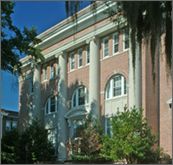Introduction
Mississippi College, founded in 1826, has been in existence nearly as long as its home city, Clinton, which was established just three years earlier. It was originally known as Hampstead Academy, then Mississippi Academy, before finally gaining its current moniker in 1830. The liberal arts college was given to the Presbyterian Church in 1842, but in 1850, it was obtained by the Mississippi Baptist Convention and has remained affiliated with that organization ever since.
The same year that the Mississippi Baptist Convention began running the college, the previously coeducational institution was changed to an all-male facility. The Central Female Institute, later known as Hillman College, was begun for women in 1853. Nearly a hundred years later, Mississippi College absorbed Hillman, once more becoming a coeducational institution of higher learning.
Both the city and the college struggled during the Civil War era, as Union forces briefly occupied Clinton. During this time, the college’s student body was disbanded and its endowment destroyed. The period immediately following the war saw low enrollment figures and financial struggles, but Mississippi College was painstakingly restored over the next several years by a group of dedicated members of its faculty, including Dr. Warren S. Webb.
The college continued to grow over time and today boasts an enrollment of approximately 5,000 students. Those students are able to enjoy not just the beautiful campus that college leaders worked so hard to restore and to preserve, but also the benefits of an historic and picturesque city located just 15 minutes west of the state capital of Jackson.
Clinton is a member of the Mississippi Main Street Association, which seeks to revitalize and maintain historic main streets and downtown areas. Students can stroll down Clinton Boulevard and shop at the Olde Towne Market, immersing themselves in the culture and traditions of their college town. Nature lovers can explore the 33 acres of wooded beauty that make up the Clinton Community Nature Center.
When it’s time to return to class, students enjoy a 320-acre campus and an institution that strives to combine “excellence and innovation in learning” with Baptist Christian values.

